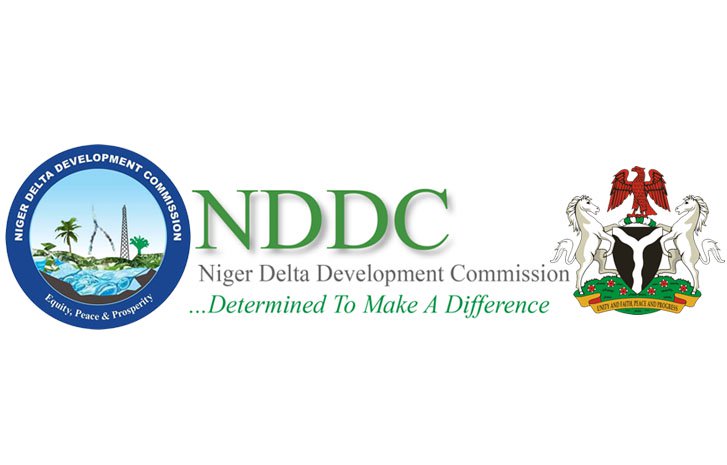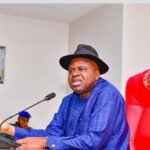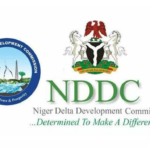The current salacious tales of the alleged sleaze, scams and heinous criminal corruption coming out of the Niger Delta Development Commission (NDDC) probe brings to mind the admonition of Honourable Dimeji Bankole, Speaker of the House of Representatives ( 2007-2011).
At 37, Bankole, scion of Chief Suarau Alani Bankole, an Egba prominent citizen and businessman, was the youngest speaker. In his own right, he proved himself as a politician of honour who, in retrospect, would now seem to be well ahead of his time.
- Alleged NDDC fraud: No contract awarded to Justice Dimgba — Firm
- Uncompleted NDDC projects dot Niger Delta
Not many Nigerians will forget in a hurry when he braved the odds to challenge his colleagues in the Houses of Assembly in the Niger Delta to do the needful and checkmate the state executives, referring possibly to the excesses of their governors.
This was at the height of the anger and the loudest noise of neglect coming from the region.
The finger pointing and accusations of neglect and marginalisation were becoming relentless and the oil-producing, but tragically deprived Niger Delta, according to Bankole, was on the verge of explosion because of the restiveness of the youths.
The speaker, with an uncanny sense of the prescience, warned that it was time for leaders of the region to be held accountable to their people and that it was time for them to account for the humongous allocation they got from Abuja every month to develop the region.
I recall his exact words: “There is a problem in the Niger Delta. The region is exploding. A state in the South South Zone collects more (from the federation account) than all the states in the North East, and the law makers in those states are not asking questions on how the money the governments collect from the federation account is used. No state assembly from this region has asked the governors questions.”
This was in September, 2008. The situation in terms of revenue allocation has not changed drastically since then. Four or five of them are among the top 10 states in terms of allocation from the federation account.
The big four are Delta, Akwa Ibom, Bayelsa and Rivers states.
Then, instead of the people asking probing questions and demanding answers and holding their respective state governors accountable, it was more politically convenient or even more fashionable for them to point fingers elsewhere.
Of course, the all-powerful government at the centre was seen as the major culprit, the one holding down their development, the one sitting on their money, not permitting resource control.
The demand, for sure, was driven more by politics than economic imperatives and the genuine desire for the development of the region.
This violent demand was always sweet music to the ears, especially since, for most of the time, the government at the centre was synonymous with the so-called northern domination and exploitation of their resources.
The North, even before independence, was seen as the parasite in the emerging socio-political and economic milieu of the emerging project called Nigeria. Time, the so-called healer, has not entirely erased that picture.
But emerging trends will help to locate the major problems of the region, if not of Nigeria, and hopefully point the way to a solution – some seeming solution, that is.
Way back in the 50s, the Henry Willink Commission set up by the colonial government to look into the issue of minority groups in the country took a particular interest in the Niger Delta.
Its report in 1958 recommended the setting up of the Niger Delta Development Board (NDDB) to consider the problems of the region. It worked for six years but it kissed the dust when the coup of 1966 took place.
Although it was revived in 1976, it quickly gave way to the Niger Delta Basin Development Authority (NDBDA) in 1978. Effort to find a more lasting solution resulted in the setting up of another commission by the Babangida administration – Oil Mineral Producing Areas Development Commission (OMPADEC).
But with an allocation of only three per cent from the federation account, it did not make serous impact. It died when the Sani Abacha regime set up the Petroleum Task Fund (PTF), which also folded up when Abacha died in 1998.
Enter General Olusegun Obasanjo in May, 1999, this time as a democratically elected president. The first sign that he would do things differently came shortly before he took office. He preferred to be called chief, like most civilian matadors who earned their slot on the chieftaincy high table.
Then he shaved off his trademark Lord Lugard-like moustache. On assumption of office he hit the ground running in compliance with the general expectation at the time. He abolished PTF and ordered a probe into its activities.
He followed it up with NDDC, the extant commission that now seems to have out-performed its predecessors in terms of meeting the expectations of Niger Deltans.
When he left office in 2007, his anointed successor, President Umaru Musa Yar’Adua, capped it all with the setting up of theMinistry of Niger Delta Affairs, specifically and exclusively for the development and the general well-being of the grieving Deltans.
He granted amnesty with generous entitlements to the militants, military wing of the Niger Delta agitation, who were busy destroying oil pipelines.
With all these goodies, the noisy protestations still made jarring noise all the way into the ears of eminent men like the aforementioned Dimeji Bankole who felt the need to call attention to the acts of omission and commission of legislators in the region. Their failure to hearken to his call for duty is partly responsible for the shenanigans that are going on today in that region.
Just take a look at it. The Niger Delta, with nine states, has the very lucky distinction of being governed and supervised by four layers of authority, all of them dishing out generous wherewithal for development.
They have the Federal Government with overall authority for the region. It is ably assisted by the Niger Delta Affairs Ministry manned by a minister who is an indigene of the region.
Then come the state governments with generous monthly allocations from Abuja. Closest to the grassroots are the myriad of local government authorities that have constitutional authority to collect their own allocations and spend them authoritatively, with no questions asked, on their people to get them out of this entrapment.
Then the octopus – the NDDC – joining all the others in a very keen and healthy competition to salvage Deltans from utter neglect and the despoliation of their territory by oil companies.
In place of a scheme like the Marshal Plan or an equitable revenue allocation formula, or to sound more palatable, resource control, what the successive governments have done to assuage the feelings of the aggrieved and the grieving Deltans was to deploy resource mechanism that would collide and summersault in keen competition to please the people, even if it cannot develop the land, for obvious reasons.
What can be more indigenous than the current arrangement? All the governors in the region are indigenous. No outsider, unlike during the military regime.
This is purely unadulterated self-government. All the local government councils have indigenous manpower. The Ministry of Niger Delta Affairs has an ebullient minister who is, by flesh and blood, indigenous. Unmistakably so.
And then the NDDC is staffed 99 per cent by pure indigenes.
The question to ask is, who is doing this to them?
Who is under-developing the Niger Delta?
Who is short-changing them?
I am not sure it is the Hausa-Fulani or their herdsmen. Or the ubiquitous Igbo traders. Certainly not the Yoruba.
The current probe into the affairs of NDDC may provide the answers if these questions do not cause anybody to faint.
But why are the ordinary men and women, the real victims of neglect in the region, not shouting this time? Or because this is their meal ticket? And the alleged loot is truly getting down to them. Is it okay? Really okay?

 Join Daily Trust WhatsApp Community For Quick Access To News and Happenings Around You.
Join Daily Trust WhatsApp Community For Quick Access To News and Happenings Around You.


